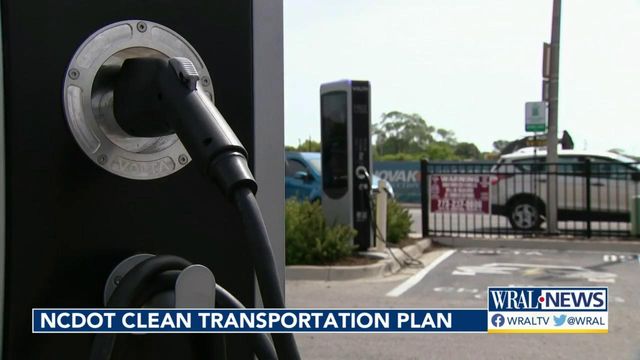State panel working to improve appeal of electric vehicles
What would it take to get you into a zero-emission vehicle? That's what a team of state leaders are working to find out.
Posted — UpdatedFriday was the kickoff event for the state's new Clean Transportation Plan. It was created in response to an executive order by Gov. Roy Cooper in January, boosting already-lofty goals for carbon reduction set back in 2018.
The January executive order, EO 246, calls for the state to achieve net-zero emissions by 2050. Energy companies are already making cuts in their emissions, but a report this week from the Environmental Defense Fund says those alone won't be enough to reach the goal.
Transportation is now the state’s number-one source for greenhouse gas emissions at 36%. Of that pollution, about three-quarters comes from passenger cars and trucks. Cooper wants to tackle that by boosting the use of transit and zero-emission vehicles.
"Whether we like it or not, the clean energy economy is coming at us," Cooper told the virtual meeting. "It's coming at us because we've got to address climate change head on, but it's coming at us because this is where the jobs and economic prosperity will be."
Cooper says new projects like VinFast, Boom Supersonic, the Toyota battery plant and offshore wind development plans have put the state at the forefront of the clean energy economy.
"We need to be ready for it," Cooper added.
Cooper's order calls for 1.25 million zero-emission vehicles on state roads by 2030, making up half of all new passenger vehicle sales by that time.
Jen Weiss is the project lead at the N.C. Dept. of Transportation. She said the number of electric vehicles registered in NC tripled over the past four years, but it's still below 40 thousand.
"That is a very big jump, and admittedly, it's going to take a lot of work to get there. But I think you're seeing the trends," Weiss told the group.
One big hurdle in front of that goal is the lack of public EV charging stations across broad stretches of the state.
"The infrastructure that we're going to need – charging stations all over North Carolina – will be a big part of this plan," Cooper said, adding that the plan will include historically underserved communities. "We've got to get EVs on the road faster."
North Carolina received $109 M for that use in the bipartisan infrastructure bill that passed Congress last year and can compete for billions in other federal funds as well.
According to Weiss, the goal is to have finished a draft of the plan in six months, then hold stakeholder meetings and public comment sessions before submitting a final plan to Cooper in April 2023.
Related Topics
• Credits
Copyright 2024 by Capitol Broadcasting Company. All rights reserved. This material may not be published, broadcast, rewritten or redistributed.




